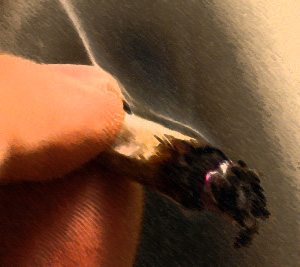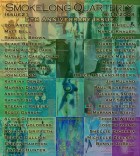You guest edited issue 6, then joined the staff for issues 8 through 18. What do you, as an editor, look for in a story? What about your own story, “The Bone Orchard,” fits this criterion?
Is criterion the singular of criteria? I never knew that. That’s cool. So the one thing that I look for in a story is risk-taking. In “The Bone Orchard,” it’s the imagined death of “Bliss” that felt risky to me, this unreality in the midst of what up to then felt very concrete. As a SLQ editor, I always felt drawn to the risk in stories, felt an immediate desire to like that story and forgive its faults, if any.
“The Bone Orchard” is a great title. I like the blend of decay (bones) and life-giving (orchard). It’s perfect for this story. What should a good title accomplish?
I think it’s important for a title not to suck. That’s often my goal for titles. I always try to have my title not take away from the story or give away a key image or line so that, when encountered later in a story, its power has been weakened by its appearance in the title. To me, as a reader, the title is often the first sign of something potentially interesting going on somewhere. It makes me want to be there.
“…they made their way through the city, toward the towers…” Is this a 9-11 story?
The story’s theme—the impossibility of certainty and safety—definitely does feel post-911-ish. Good catch, Kelly. I hadn’t noticed that before. If there’s anything else potentially cool and interesting I’m doing with this story, feel free to mention it.
You recently won Flume Press’s chapbook competition. When will your collection be published?
In August. Sherrie Flick’s previous winning Flume Press chapbook is part of the reason I became committed, as a writer, to the flash form. Such a huge thrill to be part of this series.
This issue marks SmokeLong‘s fifth anniversary, which has me thinking about longevity and growth. There’s no denying the literary arena is a fickle one, with journals coming and going, writers shooting onto the scene then falling into a long hiatus, editors changing houses, agents merging, and the trends! Don’t even get me started! How do you, as a writer, endure the ups and downs? Have you experienced any setbacks? What measures have you taken to grow?
I began writing, in that writerly kind of way, in 2003 with the amazing Terri Brown-Davidson, then continued growing and learning from 2004-2006 during my MFA, worked for about a year post-MFA with Ellen Lesser, and am currently doing a post-MFA semester working on another “condensed” form—the picture book. I recently realized that I love to write, sitting down and crafting something, figuring it out, tweaking it, trashing it, starting over, the whole shebang. I’ve done a pretty traditional path—beginning with stories published in journals, putting a collection together, moving onto books and a novel. I’ve always responded to any setback or negativity with “I’ll show you how wrong you were about me.” I think that’s why I continually put myself “out there” to have work critiqued. It’s a rather childish way to get motivated, but there it is.



 The SmokeLong Grand Micro Contest (The Mikey) is now an annual competition celebrating and compensating the best micro fiction and nonfiction online.
The SmokeLong Grand Micro Contest (The Mikey) is now an annual competition celebrating and compensating the best micro fiction and nonfiction online.